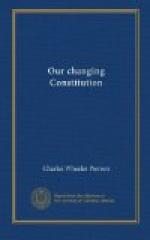[Footnote 1: See, e.g., Union Tank Line Co. v. Wright, 249 U.S., 275.]
[Footnote 2: Brushaber v. Union Pacific R.R., 240 U.S., 24.]
By far the most important and interesting of the implied limitations of the federal taxing power remains to be noticed. That is the limitation which prohibits the National Government from burdening by taxation the property or revenues or obligations of a state, or the emoluments of a state official, or anything connected with the exercise by a state of one of its governmental functions. In other words, while the National Government may tax income from bonds issued by England or France or their cities, it is powerless to tax the income from bonds of Rhode Island or the smallest of its towns.
This implied limitation, nowhere categorically expressed but enunciated in a series of decisions of the Supreme Court, has not always met with acquiescence from the executive and legislative branches of the Government. In fact, Congress is now engaged in an effort to do away with it, at least in so far as concerns the right to tax the income from state and municipal bonds. To-day, however, it still stands as one of the most striking and unique characteristics of our governmental system. It will be discussed more at length in the next chapter.
IX
CAN CONGRESS TAX THE INCOME FROM STATE AND MUNICIPAL BONDS?
That is a question which is agitating a good many people just now. Congress from time to time has seemed disposed to try it, in spite of misgivings as to the constitutionality of such legislation.[1] A recent Revenue Bill contained provisions taxing the income of future issues of such obligations, and a motion for the elimination of those provisions was defeated in the House 132 to 61. Meanwhile, protests were pouring in from state and municipal officers assailing the justice and expediency of such a tax.
[Footnote 1: See, e.g., H. Report No. 767, 65th Cong., 2d Sess., accompanying House Revenue Bill of 1918 as reported by Mr. Kitchin from the Committee on Ways and Means, page 89.]




